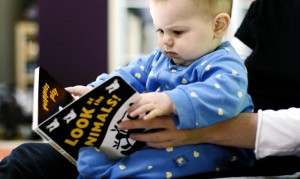
DVDs and other media that claim to be able to teach babies to read don’t work, a new study shows.
“While we cannot say with full assurance that infants at this age cannot learn printed words, our results make clear they did not learn printed words from the baby media product that was tested,” says Susan Neuman, professor in the department of teaching and learning at New York University.
There is one undeniable effect of these products—but it’s on parents, not babies. In exit interviews, parents expressed the belief that their babies were learning to read and that their children had benefited from the program in some areas of vocabulary development.
“It’s clear that parents have great confidence in the impact of these products on their children,” Neuman says. “However, our study indicates this sentiment is misplaced.”
For the study, published in the Journal of Educational Psychology, researchers examined 117 infants, aged nine to 18 months, who were randomly assigned to treatment and control groups. Children in the treatment condition received a baby media product, which included DVDs, word and picture flashcards, and flip books to be used daily over a seven-month period.
Children in the control condition did not receive these materials. Over the course of seven months, the researchers conducted a home visit, four laboratory visits, and monthly assessments of language development.
EARLY READING SKILLS?
To test children’s emerging skills in the laboratory, the researchers examined the capacity to recognize letter names, letter sounds, vocabulary, words identified on sight, and comprehension.
A combination of eye-tracking tasks and standardized measures were used to study outcomes at each stage of development. Using a state-of-the art eye-tracking technology, which follows even the slightest eye movements, researchers were able to closely monitor how the infants distributed their attention and how they shifted their gaze from one location to another when shown specific words and phrases.
The results, which included criterion and standardized measures of emergent and early reading skills, showed no differences between the infants exposed to baby media and the control group on 13 of the 14 assessments.
The only assessment that showed a difference was parents’ beliefs that their child was learning new words despite countervailing evidence from a standardized measure indicating no differences between groups.
Researchers from the University of Michigan, the University of Toronto, and Lakehead University contributed to the study.
Source: NYU








